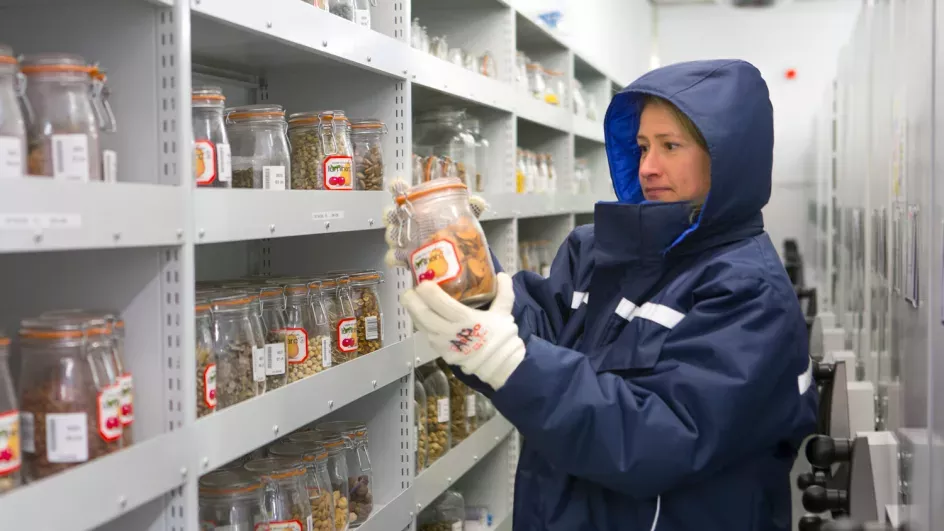Seed Conservation Techniques
Equipping seed conservation researchers with the knowledge and understanding needed to collect, conserve and manage high quality, ex-situ collections of wild plant seeds.

The Millennium Seed Bank Partnership (MSBP) is the largest ex-situ plant conservation network in the world, focusing on the conservation and use of wild plant species faced with the threat of extinction and those of greatest importance for the future.
Our Millennium Seed Bank provides training, technical support and information, to ensure that MSBP partners and collaborators have the skills, facilities and knowledge needed to successfully conserve seeds to a high standard and meet critical global seed conservation targets.
Our training courses aim to combine our partners’ knowledge of their native floras with the seed conservation skills gained over 40 years by RBG Kew.
Using the Partnership’s agreed Seed Conservation Standards as a basis, this hybrid three-week course will provide participants with training in collecting, processing, drying, storage, moisture content assessment and germination testing of seeds of wild species.
It will include a theoretical background of seed moisture relations, seed storage behaviour, germination and dormancy, prediction of seed storage life, and theoretical and practical aspects of seed bank management and design.
The programme includes an introduction to the MSBP’s role within Kew’s Science Strategy and technology work and an overview of our research programme.
There will also be opportunities to discuss actual and potential uses of seed collections in ecological restoration, livelihoods projects and seed research.
At the end of the course successful trainees will be awarded a Seed Conservation Techniques course certificate on attending the complete course.
Who is the course designed for?
The course is aimed at scientists involved in different aspects of seed conservation, therefore there are no minimum academic requirements for the course, although owing to course content, participants should be comfortable interpreting graphs, reading scientific papers and performing basic calculations.
The course will be delivered in English, therefore participants should be able to understand spoken and written technical English and be able to give presentations in English.
As the course is being delivered online, a reliable internet connection and basic IT skills are required for participation. Training on the use of the online training platform will be provided.
How is the course taught?
The course is organised in two parts. An initial week 30 September to 4 October of theoretical, partly pre-recoded sessions with Q&A sessions will ensure all participants gain a good basic understanding before attending the practical sessions onsite for two weeks from 14-25 October.
The online sessions will be half days with individual work, recorded content and exercises likely to require about 2 additional hours per day, complimented by case studies of applied seed conservation and restoration appropriate for online presentation. Successful completion of the remote training is required to join the onsite practicals.
The second part of the course will take place at the Millennium Seed Bank, Wakehurst Place, Ardingly, West Sussex, RH17 6TN, UK.
Participants can expect to cover the following topics (subject to staff availability):
- Seed banking as a conservation tool
- Seed–air moisture relations
- Seed storage behaviour
- Writing for reports and funding applications
- Seed viability
- Seed development and maturity
- Field data forms and Fieldwork apps
- Species targeting
- Planning a seed collecting programme
- Sampling genetic diversity
- Planning a seed collection mission
- Assessing and collecting techniques
- Making quality collections – fieldwork
- Post-harvest handling
- Measuring seed moisture content
- Germination and dormancy
- Seed processing and quality assessment
- Shipping Seed Collections
- Drying seeds for long-term conservation
- Seed storage containers and banking
- Seed bank design and management
- Managing seed accession data
- Current research and innovative approaches for plant cryopreservation
- Uses of seed collections
How to apply for a place
We are inviting expressions of interest with a deadline of the end of April 2024. To register your interest please contact the training coordinator Hanna Oldfield at MSBTraining@kew.org.
Data protection
The Royal Botanic Gardens, Kew, will use your personal data for the purposes of managing and processing your registration, including for record keeping and enquiry purposes. Please take time to read our Privacy Policy which explains in more detail what data we collect and why, how we use it and other information relevant to the privacy of your data.
-

Banking the World's Seeds
The Millennium Seed Bank Partnership safeguards wild plant diversity and enables its sustainable utilisation through global partnership.
-

Millennium Seed Bank
The world’s largest underground seed bank and conservation resource for diverse wild plant species.